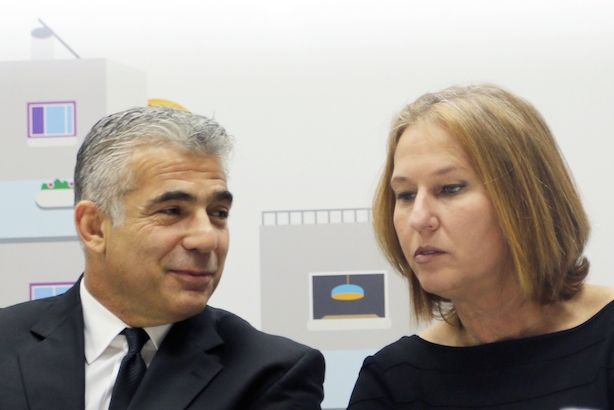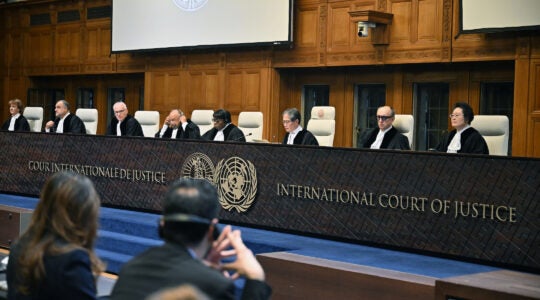
Israeli Prime Minister Benjamin Netanyahu leading a Likud faction meeting at the Knesset, Dec. 1, 2014. (Miriam Alster/Flash90)
TEL AVIV (JTA) — For the second time in about two years, Israel appears to be headed toward elections.
Israeli Prime Minister Benjamin Netanyahu said at a news conference Tuesday that he will support a bill to dissolve the Knesset, leading to elections next spring.
Ahead of the announcement, Netanyahu fired two key Cabinet ministers, Yair Lapid and Tzipi Livni, after they publicly criticized his performance as prime minister.
“In this government it’s much harder to do everything for the security and welfare of Israel’s citizens,” Netanyahu said at the news conference. “This government, from the day it was born, was adversarial. That’s because my party, the Likud, didn’t get enough votes. So from the first moment, there was friction.”
The collapse heralds an acrimonious end to a coalition of rivals ranging from the nationalist-right to the center-left. The unlikely coalition agreed early on about the need to integrate the haredi Orthodox into Israel’s economy and society but disagreed on almost everything else — from the Palestinian-Israeli conflict to the relationship between religion and state.
Should Netanyahu win another term, he has indicated that he will revert to a more stable coalition of right-wing parties — including the haredi Orthodox factions — that partnered with him before 2013 but were left out of the current fractious coalition.
“The previous government, I believe, was one of the best, most stable governments in the history of Israel, a true unity government,” Netanyahu said. “We need to elect a new government, a stronger government, a more stable government.”
As the coalition spats morphed into a full-blown crisis, Lapid, the finance minister and head of Yesh Atid, the largest party in Netanyahu’s coalition, castigated Netanyahu for playing politics instead of passing sensible legislation, including next year’s state budget.
“These elections are not about a particular issue — not about security and not about society — but an election between those who came to work and those who came to block everything,” Lapid said in a speech Tuesday. “We came to work. That’s all we wanted, that’s all we still want.”
The Knesset is likely to approve new elections in the coming days, leading to a national vote in March or April. Opposition parties already have proposed bills to dissolve the Knesset. The last national elections were held in January 2013. Elections are scheduled now for November 2017.
A poll conducted last week by the Dialog Institute suggested that early elections would hurt Yesh Atid and benefit Netanyahu’s Likud party. Yesh Atid would drop from 19 Knesset seats to 11, while Likud would rise from 18 to 24, the survey showed.
The nationalist Jewish Home led by Naftali Bennett would grow from 12 to 16 seats, while two center-left parties — Labor and Hatnua — would drop, according to the poll. Labor, guided by Isaac Herzog, would fall from 15 seats to 13, and Hatnua, led by Livni, would slip from six seats to four.
The survey also suggested general disaffection with Israel’s current leader: Only 35 percent of respondents said Netanyahu is fit to be prime minister.
Israeli coalition crises sometimes have been averted at the last minute. In May 2012, a vote to dissolve the Knesset was rendered irrelevant after Likud joined with the centrist Kadima party in a short-lived unity government.

Finance Minister Yair Lapid and Justice Minister Tzipi Livni at a news conference at Tel Aviv Municipality’s Youth House, Nov. 20, 2014. (Flash90)
Given the divisions in this coalition, however, such a deal is less likely. Since this government formed, coalition partners have fought over everything from peace talks to the economy to religious issues. Rifts began to widen after this summer’s war in Gaza, with Bennett blaming Netanyahu for not hitting Hamas harder and Lapid accusing Netanyahu of bringing relations with the United States to crisis.
Netanyahu said Tuesday that he wants to avoid a repeat of such battles and would partner with Jewish Home and the haredi Orthodox parties, which helped provide him with a stable government between 2009 and 2012. Such a coalition would oppose making concessions to the Palestinians and likely would seek to roll back laws passed last year that included haredi men in Israel’s mandatory conscription and cut subsidies to haredi families.
Yesh Atid, which was elected last year to pass those laws, likely will fade along with the promise it made to represent the Israeli political center. The history of the Knesset is littered with consensus-minded centrist parties that rose in one election only to fall in the next.
Some of Yesh Atid’s losses would probably translate into gains for a new economically progressive centrist party led by former Likud minister Moshe Kahlon that is predicted to win 13 seats. The as-yet unnamed party probably would caucus with the right, further strengthening Netanyahu’s right-wing bloc.
Before any national election campaign gets under way, Netanyahu and Bennett face primary contests in their own parties.
Bennett must fend off conservative rivals within Jewish Home, a coalition of several religious Zionist factions. In Likud, which is slated to hold a primary in January, Netanyahu faces a challenge from Danny Danon, a former deputy defense minister to Netanyahu’s right who was fired after he publicly criticized the prime minister’s handling of the Gaza war.
Though the fight in recent weeks between Netanyahu on one side and Lapid and Livni on the other over a proposed law that would enshrine Israel’s status as a Jewish state helped highlight the divisions within the coalition, the current coalition crisis seemed weeks, if not months, in the making.
The question now is what comes next.
JTA has documented Jewish history in real-time for over a century. Keep our journalism strong by joining us in supporting independent, award-winning reporting.






